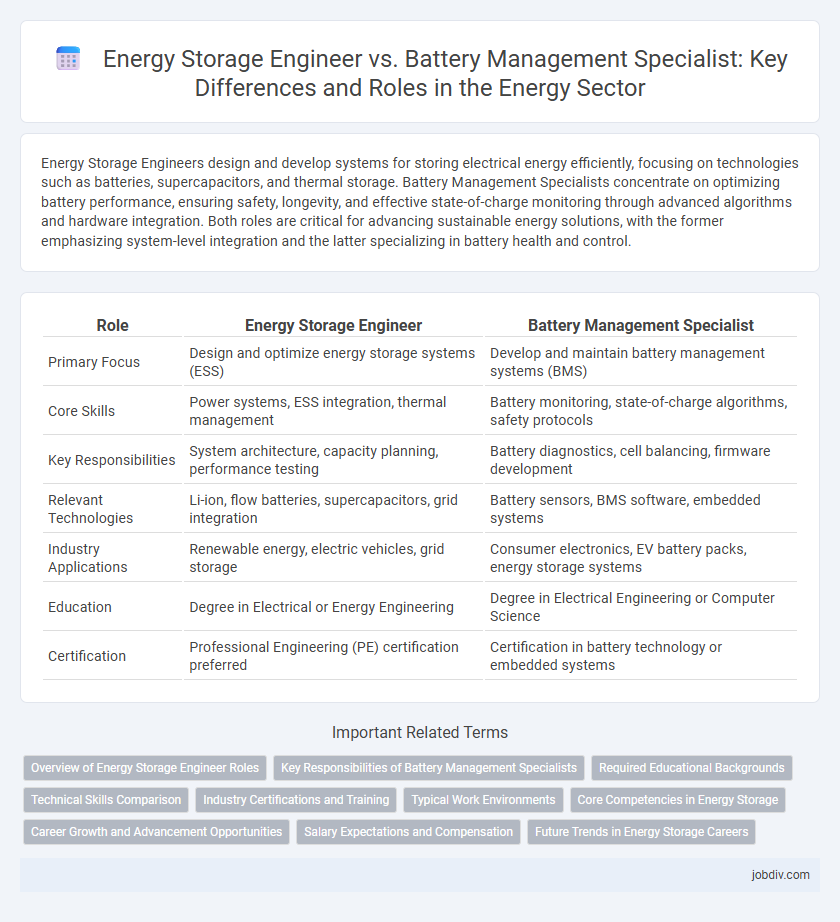Energy Storage Engineers design and develop systems for storing electrical energy efficiently, focusing on technologies such as batteries, supercapacitors, and thermal storage. Battery Management Specialists concentrate on optimizing battery performance, ensuring safety, longevity, and effective state-of-charge monitoring through advanced algorithms and hardware integration. Both roles are critical for advancing sustainable energy solutions, with the former emphasizing system-level integration and the latter specializing in battery health and control.
Table of Comparison
| Role | Energy Storage Engineer | Battery Management Specialist |
|---|---|---|
| Primary Focus | Design and optimize energy storage systems (ESS) | Develop and maintain battery management systems (BMS) |
| Core Skills | Power systems, ESS integration, thermal management | Battery monitoring, state-of-charge algorithms, safety protocols |
| Key Responsibilities | System architecture, capacity planning, performance testing | Battery diagnostics, cell balancing, firmware development |
| Relevant Technologies | Li-ion, flow batteries, supercapacitors, grid integration | Battery sensors, BMS software, embedded systems |
| Industry Applications | Renewable energy, electric vehicles, grid storage | Consumer electronics, EV battery packs, energy storage systems |
| Education | Degree in Electrical or Energy Engineering | Degree in Electrical Engineering or Computer Science |
| Certification | Professional Engineering (PE) certification preferred | Certification in battery technology or embedded systems |
Overview of Energy Storage Engineer Roles
Energy Storage Engineers design and develop systems that store energy efficiently, focusing on integrating technologies such as lithium-ion batteries, flywheels, and pumped hydro storage to enhance grid reliability. They analyze performance metrics, optimize charging and discharging cycles, and ensure the scalability of storage solutions to support renewable energy sources. These engineers work closely with electrical, mechanical, and software teams to innovate energy storage technologies that meet safety, cost, and sustainability standards.
Key Responsibilities of Battery Management Specialists
Battery Management Specialists focus on designing, implementing, and optimizing battery management systems (BMS) to ensure safe, efficient, and reliable battery operation. Their key responsibilities include monitoring battery health, state of charge (SOC), state of health (SOH), and thermal management to prevent failures and extend battery life. They develop algorithms for battery performance diagnostics and integrate BMS with energy storage systems to enhance overall system efficiency and safety.
Required Educational Backgrounds
Energy Storage Engineers typically require a bachelor's degree in electrical engineering, mechanical engineering, or materials science, with advanced knowledge in electrochemical systems and renewable energy technologies. Battery Management Specialists often hold degrees in electrical or electronics engineering, emphasizing control systems, battery chemistry, and embedded software programming for battery management systems (BMS). Both roles benefit from hands-on experience with energy storage devices, but Battery Management Specialists usually need in-depth expertise in battery health diagnostics, state-of-charge estimation, and thermal management.
Technical Skills Comparison
Energy Storage Engineers specialize in designing and optimizing energy storage systems, emphasizing power conversion, thermal management, and system integration. Battery Management Specialists focus on battery cell monitoring, state-of-charge estimation, and implementing safety protocols using embedded software and hardware diagnostics. Both roles require proficiency in battery chemistry, electrical engineering, and data analytics, but the former leans toward system-wide architecture while the latter centers on battery health and performance optimization.
Industry Certifications and Training
Energy Storage Engineers typically hold certifications such as Certified Energy Manager (CEM) and possess advanced training in thermal and electrochemical storage systems, emphasizing grid integration and large-scale energy solutions. Battery Management Specialists often acquire credentials like the Battery University Certification and complete specialized training in battery diagnostics, state-of-charge algorithms, and thermal management techniques to optimize cell performance and safety. Both roles require continuous education in evolving standards, including IEC 62619 for battery safety and IEEE 1547 for interconnection, ensuring compliance with industry best practices.
Typical Work Environments
Energy Storage Engineers typically work in industrial settings, research laboratories, and renewable energy facilities where they design and optimize large-scale energy storage systems. Battery Management Specialists are often employed in manufacturing plants, automotive companies, and electronics firms, focusing on battery performance, safety, and integration. Both roles require collaboration with cross-functional teams to improve energy efficiency and system reliability in their respective environments.
Core Competencies in Energy Storage
Energy Storage Engineers possess strong expertise in designing and optimizing energy storage systems, with competencies in thermal management, power conversion, and system integration. Battery Management Specialists focus on state-of-charge estimation, battery health monitoring, and safety protocols, ensuring longevity and reliability of battery cells. Both roles require deep knowledge of electrochemical properties, energy density optimization, and real-time data analytics for efficient energy storage solutions.
Career Growth and Advancement Opportunities
Energy Storage Engineers often experience rapid career growth by engaging in the design and optimization of large-scale storage systems, which are critical for the integration of renewable energy into power grids. Battery Management Specialists advance by developing sophisticated battery monitoring and control algorithms that enhance battery life and safety, making them indispensable in electric vehicle and consumer electronics industries. Both roles offer strong advancement opportunities, with Energy Storage Engineers moving toward project management and system architecture, while Battery Management Specialists often transition into research and development or executive technical leadership positions.
Salary Expectations and Compensation
Energy Storage Engineers typically command an average salary ranging from $85,000 to $120,000 annually, reflecting their expertise in designing and optimizing large-scale energy storage systems. Battery Management Specialists often earn between $75,000 and $110,000 per year, with compensation influenced by skills in battery health monitoring and charge management. Variations in salary depend on factors such as industry demand, geographic location, and years of professional experience within the energy sector.
Future Trends in Energy Storage Careers
Energy Storage Engineers are increasingly focusing on integrating advanced materials and grid-scale applications to improve system efficiency and sustainability. Battery Management Specialists concentrate on developing intelligent algorithms for real-time monitoring and extending battery lifespan in electric vehicles and renewable energy systems. Future trends indicate a convergence of these roles, emphasizing AI-driven optimization and solid-state battery technologies to meet expanding energy storage demands.
Energy Storage Engineer vs Battery Management Specialist Infographic

 jobdiv.com
jobdiv.com